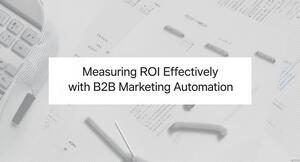Measuring ROI Effectively with B2B Marketing Automation
Corps
That's why B2B Marketing Automation has become a mission-critical tool. It doesn’t just streamline operations—it helps marketers prove value, optimize campaigns in real-time, and connect every activity to business outcomes.
Gone are the days when marketers struggled to justify budgets with vague results. Automation enables full-funnel tracking—from first touch to closed deal. With proper setup, teams can now attribute revenue, assess campaign efficiency, and enhance marketing’s influence on pipeline growth.
Automation as the Foundation of Performance Marketing
B2B Marketing Automation systems are built with performance in mind. Every email, landing page, workflow, and interaction is automatically tracked and analyzed. This gives marketers visibility into how leads are progressing, what content converts, and which tactics need improvement.
By using these insights, businesses can shift from gut-feeling decisions to data-driven ones. Campaigns are launched with clear KPIs, continuously monitored, and refined through A/B testing and behavioral data. This agile approach is critical in today's competitive B2B environment.
Setting Measurable Goals from the Start
One of the first steps in improving ROI through B2B Marketing Automation is establishing measurable objectives. Whether it’s increasing form submissions, reducing lead acquisition cost, or improving pipeline conversion rate, automation allows marketers to set specific, trackable goals.
These goals are tied to each stage of the funnel—awareness (e.g., CTRs and traffic), consideration (e.g., downloads and webinar signups), and decision (e.g., demo requests or trials). Marketing automation platforms track each of these actions, storing the data for reporting and optimization.
Attribution Modeling and Source Tracking
Understanding where revenue comes from is essential for any B2B marketer. B2B Marketing Automation platforms offer multi-touch attribution modeling that connects campaign efforts to pipeline growth. Whether a lead originated from a PPC ad, organic blog, or LinkedIn webinar, automation tools track the source and assign value.
These models go beyond first-click or last-touch attribution, offering nuanced insights into which touchpoints influenced the buying decision. This empowers marketing teams to allocate budget where it generates the most impact—and prove their contribution to revenue more effectively.
Real-Time Dashboards and Campaign Analytics
One of the strengths of B2B Marketing Automation is real-time access to performance metrics. Marketers can build dashboards to monitor open rates, click-throughs, lead scores, and MQL-to-SQL conversion in real-time.
For example, if a campaign is underperforming mid-week, the team can quickly test new subject lines, change timing, or adjust targeting without losing momentum. This responsiveness allows for continuous improvement and ensures that ROI isn’t left to chance.
Enhancing Lead Quality, Not Just Volume
Many marketers still equate success with lead volume—but quality is what drives ROI. B2B Marketing Automation helps prioritize quality by scoring leads based on firmographic data, engagement level, and behavioral triggers.
Instead of handing off unqualified contacts to sales, automation ensures that only high-intent, sales-ready leads make the cut. This alignment between marketing and sales improves close rates, shortens the sales cycle, and ultimately leads to a better return on investment.
Campaign Optimization Through A/B Testing
A/B testing is no longer a luxury—it’s a necessity. With B2B Marketing Automation, marketers can test everything from email subject lines to landing page layouts and CTA placements. These experiments are automated and monitored for performance, enabling data-backed decisions.
When even small adjustments lead to better engagement, the cumulative ROI improvement over time can be massive. Automation tools also make it easy to scale winning variations across multiple segments or campaigns, turning insights into action with minimal effort.
Aligning Content Strategy with Revenue Goals
Your content isn’t just for branding—it’s for converting. With B2B Marketing Automation, marketers can measure how specific assets contribute to conversions and pipeline movement. For example, if a case study drives more demo requests than a blog post, resources can be shifted accordingly.
This type of intelligence ensures that every asset has a purpose. Over time, marketing teams develop content strategies that are not just engaging, but directly tied to ROI performance.
Pipeline Acceleration and Sales Enablement
When marketing delivers high-quality leads, the sales team becomes more efficient. B2B Marketing Automation allows for real-time lead alerts, detailed contact history, and behavior insights that help sales reps tailor conversations.
Instead of starting cold, reps know exactly what the lead has read, downloaded, or interacted with. This shortens the sales cycle and improves close rates, driving better ROI from both marketing and sales investments.
Forecasting and Budget Planning with Data
One often overlooked benefit of B2B Marketing Automation is its impact on planning and forecasting. Because every campaign is tracked, marketers can project future results based on historical data. If a webinar campaign typically generates 10 MQLs per $1,000 spent, teams can plan future initiatives with greater accuracy.
This predictability makes it easier to justify budgets, allocate resources, and report performance to stakeholders. As marketing becomes more accountable, it gains more influence within the organization.
Read the Full Blog Now @ https://acceligize.com/featured-blogs/what-is-b2b-marketing-automation-and-why-it-matters-in-2025/
About Us
Acceligize is a global B2B demand generation company, specializing in delivering high-quality leads and data-driven marketing solutions for modern businesses. Leveraging AI, content syndication, and targeted outreach strategies, Acceligize empowers B2B organizations to accelerate pipeline growth and increase ROI. As industry leaders in multichannel lead generation, our mission is to help you reach the right audience with the right message at the right time.









commentaires